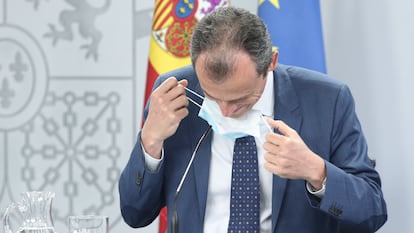Spain may have access to Covid-19 vaccine by early next year, says science minister
Pedro Duque notes that the country is part of the EU team negotiating with drug companies, and that there are five Spanish prototypes underway

Spain’s Science Minister, Pedro Duque, said that six to 12 months from now Spanish citizens may have access to coronavirus vaccines through the public healthcare system.
Speaking at a news conference after the Tuesday Cabinet meeting, Duque said that Spain is part of a team of seven European countries heading the European Union’s negotiations with vaccine makers.
“We are optimistic that there will be a vaccine, that we will be able to determine which vaccine works best, and that it will be available to the Spanish healthcare system when its safety and effectiveness have been sufficiently demonstrated,” said Duque. “We believe that early next year is when we will have doses ready with all the necessary guarantees.”
We don’t know if the first vaccine will be the most effective one, or if we might have to wait for another oneScience Minister Pedro Duque
The British drug company AstraZeneca, which has partnered with Oxford University to develop a vaccine, announced two weeks ago that by the end of this year it will have around 100 million doses ready for distribution in the EU. But the company itself has admitted “that the vaccine may not work.”
The urgency of the situation has pushed public institutions and private companies into manufacturing experimental vaccines before checking that they truly work. “We don’t know if the first one will be the most effective one, or if we might have to wait for another one,” acknowledged the Spanish minister on Tuesday.
Spain is part of the EU’s negotiating team together with Germany, France, the Netherlands, Italy, Poland and Sweden. The plan is for a tiered distribution that will begin with at-risk groups, such as the elderly and healthcare workers. The rest of the population will probably have to wait longer, possibly until 2022, according to experts such as the French virologist Marie-Paule Kieny, a former official at the World Health Organization (WHO).
Projects in Spain
There are currently 149 experimental vaccines against Covid-19 in the world, and 17 of them are already being tested on humans, according to the WHO. Five research groups from Spain have developed as many prototypes and have begun trials with animals, according to the Spanish Science Ministry.
The most advanced project is led by the virologist Mariano Esteban, whose team at the National Biotechnology Center in Madrid is desperately seeking rhesus macaque monkeys – which are currently in high demand to test drugs against Covid-19 – in order to continue with experiments that have already shown promise on mice.
“An animal testing phase has ended and it provides a lot of hope about this kind of vaccine. The right defenses were developed, and it was even tested with a real virus. That is to say that we’re pretty far along,” said Duque about Mariano Esteban’s project, which uses a mild strain of the Vaccinia virus that is already in use to make smallpox vaccines.

The minister noted that four Spanish biotech companies have received €1.3 million in public funding to adapt their facilities to the production of human vaccines. Esteban’s prototype will be manufactured by CZ Vaccines, which has a factory in O Porriño, in the northwestern region of Galicia.
“Within a few months, there is going to be national production of a vaccine that can be used on humans. I think this is a very positive outcome of the projects that we have funded,” said Duque. “Also as a result of this, there are global companies in talks with Spanish companies to bring part of their vaccine manufacturing to Spain.”
Duque’s remarks come after two weeks of online protests by Spain’s scientific community against their precarious working conditions and the general state of science and research in the country. Acknowledging the issue, the minister said on Tuesday that he hopes to have “a plan with reforms and specific resources” ready by July in order to address the changes that need to be made to the Spanish science and research system.
“At this time, all of society, government agencies, parliamentary groups – everyone agrees that we need to reinforce our science system and that now is the time to invest in science,” said Duque, an astronaut by trade who visited the International Space Station in 2003.
English version by Susana Urra.
Tu suscripción se está usando en otro dispositivo
¿Quieres añadir otro usuario a tu suscripción?
Si continúas leyendo en este dispositivo, no se podrá leer en el otro.
FlechaTu suscripción se está usando en otro dispositivo y solo puedes acceder a EL PAÍS desde un dispositivo a la vez.
Si quieres compartir tu cuenta, cambia tu suscripción a la modalidad Premium, así podrás añadir otro usuario. Cada uno accederá con su propia cuenta de email, lo que os permitirá personalizar vuestra experiencia en EL PAÍS.
¿Tienes una suscripción de empresa? Accede aquí para contratar más cuentas.
En el caso de no saber quién está usando tu cuenta, te recomendamos cambiar tu contraseña aquí.
Si decides continuar compartiendo tu cuenta, este mensaje se mostrará en tu dispositivo y en el de la otra persona que está usando tu cuenta de forma indefinida, afectando a tu experiencia de lectura. Puedes consultar aquí los términos y condiciones de la suscripción digital.









































